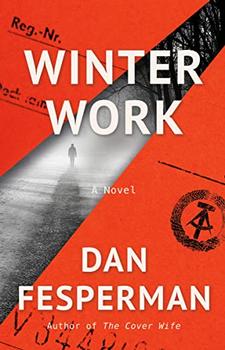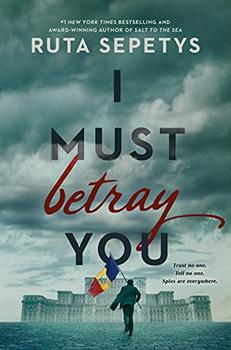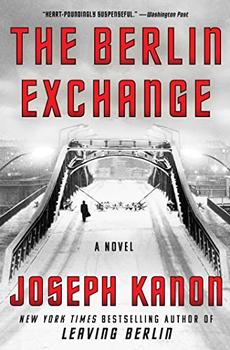Summary | Excerpt | Reviews | Beyond the book | Read-Alikes | Genres & Themes | Author Bio

A novel
by Dan FespermanDan Fesperman's novel Winter Work is set during the aftermath of the fall of the Berlin Wall in 1989, which sparked the reunification of East and West Germany about a year later. After World War II, East Germany was sealed behind the Iron Curtain and became a police state similar to the USSR. Loyalty to the state was everything, and neighbor spied upon neighbor; the atmosphere was one of constant fear and paranoia. As Fesperman writes, "Buy a book and someone always had to know which one, and then made a note of it. Make a phone call and you assumed it was overheard. Say something critical, even in passing or in jest, and perhaps someone would get the wrong idea. If you heard nothing about it later, was that good or was that worrisome?" The Stasi, East Germany's secret police, was responsible for the enforcement of the loyalty requirement. At one point, the organization is thought to have had about 90,000 employees and 170,000 informants (see Beyond the Book).
All this changed in little more than the blink of an eye. Although discontent had been building for decades, the dismantling of East Germany's system of government happened in just a few months. One result of the rapid collapse was the demise of the Stasi, which in turn initiated a mad scramble by the United States' CIA and the USSR's KGB to snap up as many of the organization's secret files as possible (the KGB so it could leverage operatives already in place, the CIA to expose them). Both offered payment and sometimes relocation to former Stasi officials in exchange for information.
The protagonist of Winter Work is one such Stasi officer. Fifty-seven-year-old spymaster Emil Grimm fears he'll face imprisonment for his past actions if he can't dig up some valuable material to give the CIA; he's hoping for amnesty and a new identity and life in the USA. He and a coworker, Lothar Fischer, have uncovered exactly what they need to ensure their security, but Lothar is murdered before they can establish contact with the CIA. The crime sets off a cat-and-mouse game as Emil seeks to identify the murderer, retrieve the hidden information and place it in the hands of the CIA before he shares Lothar's fate.
Claire Saylor (who has appeared in two of Fesperman's other novels, Safe Houses and The Cover Wife), is a CIA agent tasked with establishing contact with former Stasi personnel and evaluating their proffered information. After an encounter that doesn't go as planned, her superiors doubt her abilities but give her one last chance to succeed. As her storyline merges with Emil's, she bets her career that he's the "real-deal," and aids him despite her boss's objections.
There's a lot to love about this novel. First, the author paints a truly vivid portrait of time and place; as the title suggests, the action is set during the winter, and coupled with grim depictions of life in the former Soviet Bloc country, the atmosphere throughout is palpably cold and bleak. Beautifully descriptive phrases (e.g., "A doughnut glaze of ice already coated the shallow end of the lake") pepper the narrative, adding to the effect. Fesperman also captures the chaos that followed the wall's destruction, particularly from the standpoint of those who'd been heavily invested in East Germany's bureaucracy pre-fall.
The other highlight is the author's ability to create complex, multi-layered characters. Emil in particular is drawn with nuance, establishing a fine balance between the man who's lost a friend and the man who's a ruthless, calculating spymaster. The only disappointment I had with the book was how some of the minor characters were portrayed. Claire's CIA superiors are cartoonishly hostile, and the bad guys are absolute caricatures. The author is certainly capable of creating characters with depth, so I'm puzzled as to why these are so poorly drawn. Fortunately, their appearances are brief, and their flatness doesn't detract from my overall opinion of the novel.
Although the book isn't exactly a page-turner, the narrative pace is excellent and I found the story engaging from start to finish. The plot is complicated with enough twists and turns to keep readers guessing, but not so intricate that it becomes confusing.
In short, I thoroughly enjoyed Winter Work. Its focus on a pivotal moment in world history makes this a great selection for anyone interested in the time period, and its complex plot will appeal to readers who enjoy espionage thrillers.
![]() This review was originally published in The BookBrowse Review in August 2022, and has been updated for the
January 2024 edition.
Click here to go to this issue.
This review was originally published in The BookBrowse Review in August 2022, and has been updated for the
January 2024 edition.
Click here to go to this issue.

If you liked Winter Work, try these:

by Ruta Sepetys
Published 2023
A gut-wrenching, startling historical thriller about communist Romania and the citizen spy network that devastated a nation, from the #1 New York Times bestselling, award-winning author of Salt to the Sea and Between Shades of Gray.

by Joseph Kanon
Published 2023
From "master of the genre" (the Washington Post) Joseph Kanon, an espionage thriller set at the height of the Cold War, when a captured American who has spied for the KGB is swapped by the British and returns to East Berlin needing to know who arranged his release and what they want from him.
Your guide toexceptional books
BookBrowse seeks out and recommends the best in contemporary fiction and nonfiction—books that not only engage and entertain but also deepen our understanding of ourselves and the world around us.